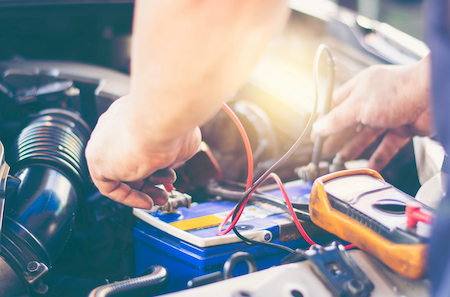On most days, you slide behind the wheel, turn the key, and start your day. Your car starts. Everything works well. You move throughout your day without thinking about how well your car operates.
On some days, you start the car and instantly are alerted to an issue. Maybe it’s a noise, or a sound.
It takes a lot of power to start your car and bring the entire system up and running. That’s where you’ll notice most inconsistencies with your vehicle.
Yet problems can begin at any point during your drive. What if you’re moving down the road and the battery light comes on while you’re driving? What does it mean? What should you do?
How a conventional battery works
While the sale of electric cars is increasing, most drivers on the road today still use conventional vehicles. That means most vehicles are still powered with a conventional car battery.
Car batteries are used to store energy to keep the car and its accessories running. Batteries use chemical energy to start, and to recharge during operation.
When you insert the key or push a button, it signals the battery to switch to “on.” The car battery converts chemical energy into electrical energy, and delivers it to the starter to turn over the engine.
The standard car battery runs on 12-volts of power. If the battery’s voltage drops, it impacts performance. It can change the way your car runs as you drive down the road. It can also show up in the accessibility of your vehicle’s accessories. Ever had a problem with the radio working, or the headlights dimming? That’s a clear indicator you have a problematic battery.

What it means if the battery light comes on while you drive
It takes a lot of power to start the engine. It’s when you’ll most likely notice a problem with the way your car operates.
Yet things can also happen as you drive down the road. If you notice the battery light turn on your dashboard, you could be dealing with multiple issues:
- A failing battery
- Corroded battery cables
- A faulty alternator
- Damaged battery cells
- A loose battery cable
- Defective wiring in the car’s charging system
Most problems start small and escalate over time. Paying attention to how your vehicle operates can alert you to minor issues before they become full-blown problems. The battery light is an indicator of the onset of a problem. It could be something small or several issues at once.
If the battery light comes on and stays on, there’s a problem with its performance. If left unaddressed, your battery can run out of power while you’re driving. And that can impact safety and performance.
What can you do?
It’s only natural to want to troubleshoot an issue before you bring it in for a full inspection. If your battery light comes on and stays on, there are a few things you can check before scheduling an appointment. Minor issues can include:
Loose connection – your car goes through a lot as you drive. Connections can jiggle loose, causing your battery to lose full power. Check to see if the cables are still properly attached to the battery. A poor connection can cause a short within the system, illuminating the battery light.
Dirty battery – driving can cause a whirlwind of dirt, debris, grime, chemicals, and other materials to settle underneath the hood. If your battery is filled with dirt or grime, it can impact the connection, and illuminate the battery light.
Corrosion – chemicals or pollutants can come from the exhaust system or spray up from the road. If it accumulates on the top of the battery terminals, it may result in corrosion. This is more common in the summer months, where heat is prevalent.
When you clean your car, pop the hood and look underneath. If you notice dirt, grime, or corrosion forming on top of the battery, you can clean it and ensure the connections are in place. But if you do these things and the battery light is still displayed on your dashboard, the problem is more serious and requires a mechanical inspection.
Is it safe to keep driving?
If you’re driving and your battery light turns on, it’s alerting you your car is unsafe to drive. Because it’s illuminated because of a faulty alternator, battery connection, or some other mechanical problem, it’s wise to have it inspected as quickly as possible.
Safety is everything. Find a safe spot to pull over, then further assess the situation. Is it difficult to steer? Do you notice other compilations with your drive?
If it impacts your power steering, it can be difficult to drive. That makes it unsafe for you to be out on the road, putting you and other drivers around you at risk.
If you are close to home, or can drive your car in to see one of our mechanics, we can assess the situation and get you back on the road. Driving the car may put you in danger, so it’s important to get it checked out before you start driving once again. Keep in mind that once you turn the engine off, you might not have enough battery power left to start it back up. Ensure you’re in a safe place before you flip the switch and turn off your vehicle.
To get the most out of what’s left in the battery, reduce all accessories to ensure full energy is going to the essentials. Turn off the heater or air conditioner, don’t use power windows, unplug your devices from the charger, and flip the radio to the off position. Keep an eye on the temperature gauge, as engine overheating may be a further sign of charging problems.
Have you experienced problems with your battery light coming on while you drive before?
